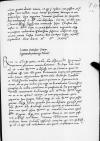Applicui huc ad oviculas meas non ingratus pastor, utpote diu desideratus egique cum eis in hoc meo primo adventu ad eum modum, quo illos mecum contentos spero futuros acciditque supra meam opinionem, quod praeter ⌊canonicos meos⌋ et magnam ⌊civium⌋ ⌊Thorunensisque consulatus⌋ frequentiam ⌊nobiles tum etiam omnes terrae Culmensis⌋ cum ipso ⌊domino palatino⌋ iudiciis vacantes, quae statis temporibus servari solent, ⌊Thoruniae⌋ invenerim, a quibus humanissime exceptus, omnia erga me benevolentiae studia offendi.
Quod cum nullis meritis meis evenisse cognosco, Deo in primis et Serenissimae Maiestati Vestrae acceptum fero et eas, quas tenuitas mea potest, gratias habeo. Ceterum inter alia, quae cum ⌊canonicis meis⌋ transegi, obtulit se mentio de administratione ⌊episcopatus Pomezaniensis⌋, quam Serenissima Maiestas Vestra ⌊praedecessori meo⌋ olim concedere dignata fuit, qua in re ⌊canonici mei⌋, quomodo administratio illa habeat et an assensus huiusmodi pontificis summi accesserit, edocere me non potuerunt. Supplico igitur Serenissimae Maiestati Vestrae humillime, velit me reddere certiorem, quibus modis me in ea administratione gerere debeam. Curia Romana movit paulo ante mihi stomachum et loculis meis nauseam expilavitque me, ut ne pilus quidem reliquus manserit, ad illam ob istiusmodi administrationem nequaquam deferre quippiam decrevi, quandoquidem in ea reperiuntur adeo inhumani et immites, qui si possent, communem omnibus aerem gratis darent nemini. Et ego, cf. Cic. Brut. 287 imitari neque possim, si velim, nec velim fortasse, si possim ⌊si vellem, non possem, et si possem non vellemcf. Cic. Brut. 287 imitari neque possim, si velim, nec velim fortasse, si possim ⌋, meas tenues facultates deinceps in eos profundere.
Quae negotium Varmiense spectant, ex ⌊conventu ⌊Marienburgensi⌋⌋ Serenissimae Maiestati Vestrae describam. Cui me ut domimo meo clementissimo suppliciter commendo. Iesus Christus, Dominus noster, Serenissimam Maiestatem Vestram in omnis felicitatis augmento atque in prospera valetudine quam diutissime sospitem conservet atque contra omnes hostes tueatur.

